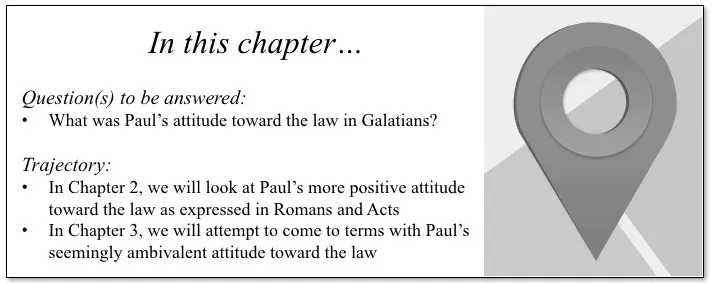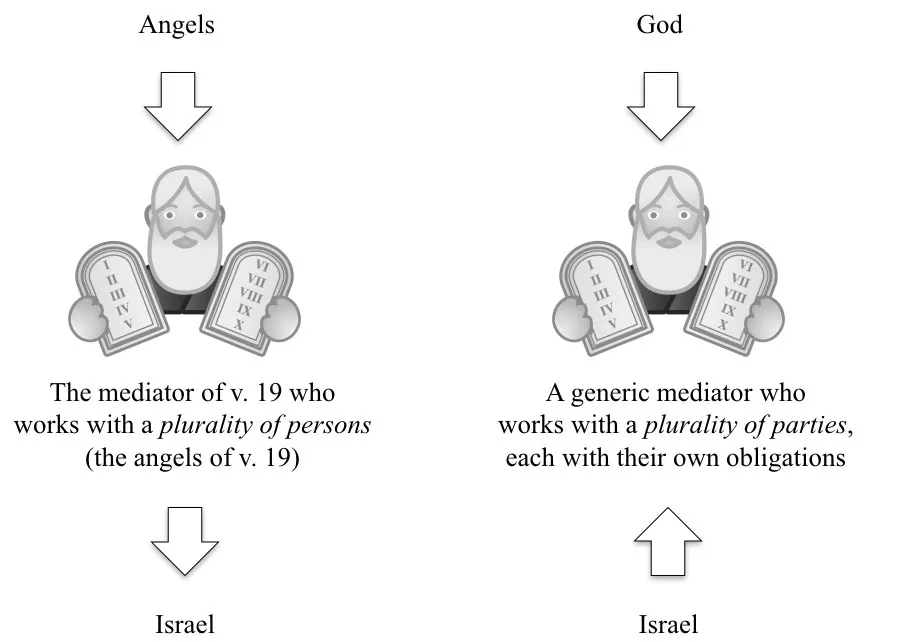![]()
Part I
Paul’s Seeming Ambivalence toward the Law
![]()
1
Paul as Dead to the Law (Galatians)
Were the Apostle Paul to be brought before the Sanhedrin to answer for his negative statements on the law of Moses, it is likely that the Letter to the Galatians would be presented as Exhibit A. Galatians could be described, in the words of one early Christian-Gentile author, as the “most decisive against Judaism” among Paul’s epistles. Imbued with obvious pathos which gives it an urgent, at times even hostile, tone, Galatians surely would have provided grist for anyone wishing to accuse Paul of treachery against the traditions of his ancestors.
In Galatians we encounter the thought world of an apostle who appears to have made a clean break with the law: “For through the law I died to the law” (ἐγὼ γὰρ διὰ νόμου νόμῳ ἀπέθανον, 2:19). His argument for this apparent break is wide-ranging and encompasses the law’s origins, purpose, consequences, and duration. This chapter will explore each of these areas in turn to demonstrate that Paul’s view of the law in Galatians was uniformly and comprehensively negative.
The Law’s Tainted Origins
According to Gal 3:19d the law was “put in place through angels, by the hand of a mediator” (διαταγεὶς δι᾿ ἀγγέλων ἐν χειρὶ μεσίτου). The two prepositional phrases therein have been variously interpreted and denote either that the angels authored the law or that they merely took part in an auxiliary role in its origination. Evidence for angelic authorship will be dealt with first.
Beginning with the textual tradition, the LXX of Deut 33:2 places the angels on Mount Sinai at God’s right hand: ἐκ δεξιῶν αὐτοῦ ἄγγελοι μετ᾿ αὐτοῦ. Here ἄγγελοι is a rendering of the difficult Hebrew term אֵשְׁדָּת which modern versions translate variously as “host” (NRSV), “flaming fire” (ESV), or “flashing lightning” (NAS). There is also a rich tradition in Jewish and Christian literature (including Josephus, Philo, Acts 7:38, 53, and Heb 2:2) in which the angels are viewed as having participated in the origin of the law. It is even possible, as J. Louis Martyn suggests, that Paul’s opponents cited some of these traditions to the Galatians as proof of the heavenly origin of the law, which would help to explain Paul’s remark in 1:8 about the opponents’ gospel originating from an “angel from heaven.”
Second, there are linguistic signals that Paul may be referring to angelic authorship of the law in 3:19. The prepositional phrase δι᾿ ἀγγέλων can be understood causally if διά is given the force of ὑπό (i.e., the law as instituted by angels). Moreover, as Martyn points out, Paul’s word choice in this section in describing the genesis of the law is telling. Instead of using the traditional phrase “God gave (δίδωμι) the law,” Paul uses more passive verbiage: “the law happened” (γίνομαι; v. 17), “the law was added” (τίθημι; v. 19), and “the law was put in place” (διατάσσω; v. 19). By contrast, the Abrahamic promises were “spoken” (λέγω; v. 16), “ratified” (προκυρόω; v. 17) and “given” (χαρίζομαι; v. 18) by God. As Martyn summarizes, “Using strong ‘speaking’ and ‘giving’ verbs to attribute the Abrahamic promise directly and clearly to God, Paul refers to the Law’s genesis either by employing colorless verbs or by referring to the genesis of the Law as the act of angels.”
Third, the notoriously difficult verse 20 (ὁ δὲ μεσίτης ἑνὸς οὐκ ἔστιν, ὁ δὲ θεὸς εἷς ἐστιν) could refer to a mediator standing between the angels and Israel (Figure 1.1, left side). Here the oneness of God (likely an echo of the Shema) is contrasted with the non-oneness of the person or work of ὁ μεσίτης. If the Greek article is taken as anaphoric, μεσίτης refers back to the mediator of the previous verse, widely assumed to be Moses. Taking the mediator to be, by definition, the mediator of a plurality, Moses mediates on behalf of the many, that is, the angels. If God were the originator, he would have dealt with Israel directly, without the need for a mediator.
Figure 1.1. Two Popular Interpretations of ὁ μεσίτης ἑνὸς οὐκ ἔστιν in Gal 3:20.
Other scholars reject the idea of angelic authorship of the law, concerned that it goes too far in distancing the law from God. Moo, for instance, believes that the διά of v. 19 should be interpreted instrumentally (the law was ordained through angels) rather than causally. He also asserts that the connection between angels and authorship of the law has been overplayed:


